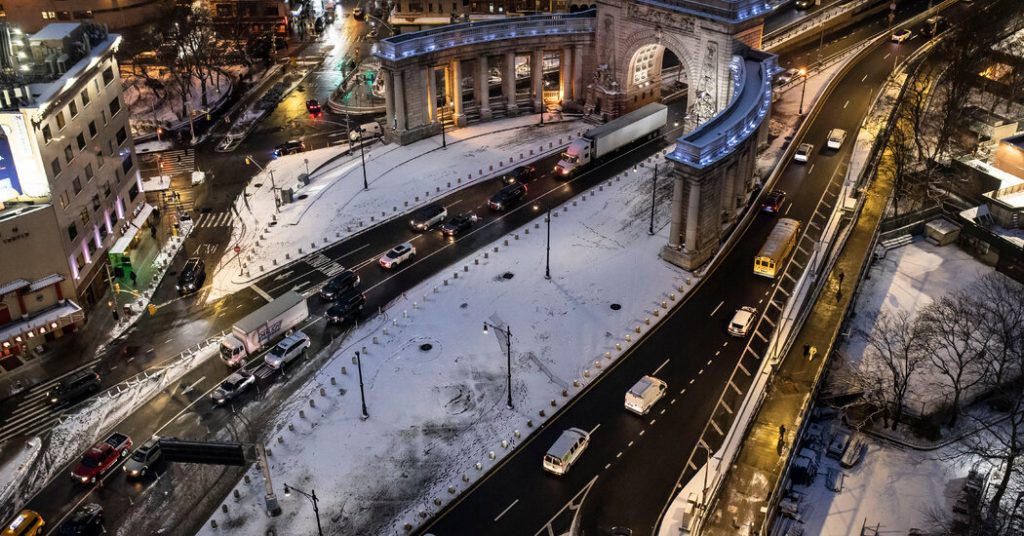The Department of Transportation delivered a blow to big transportation projects in the two most populous blue states last week when it moved to revoke its approval of New York City’s congestion pricing program and announced a review of California’s high speed rail project the next day.
The D.O.T.’s moves arrive amid the Trump administration’s sweeping campaign to freeze billions in climate funding, cut the federal work force and slash regulations. The agency has also begun the process of rolling back standards requiring automakers to make cars and trucks more fuel efficient.
These and other actions have set off alarm bells among transit advocates and rank-and-file transportation planners, who worry the D.O.T. will meddle in long-planned state and local construction projects and redirect funding from cities to suburbs.
High speed trains in California and the congestion pricing program in New York would have clear climate benefits. The $9 toll on cars entering Manhattan, the first project of its kind in the U.S., will fund public transportation improvements and is expected to cut traffic emissions in the tolling zone. California’s rail line would offer solar-powered transportation to millions of people traveling between San Francisco and Los Angeles annually by 2030.
Both projects have faced serious political opposition. The D.O.T.’s movement on California’s train funding came one week after Republican lawmakers in the state sent a letter to President Trump expressing support for a federal investigation.
And congestion pricing, which rolled out in New York early this year after Democratic Gov. Kathy Hochul delayed the start date, has detractors on both sides of the aisle.
The D.O.T. and the White House did not immediately respond to requests for comment.
Targeting congestion pricing
In a letter to Hochul last week, Sean Duffy, the transportation secretary, wrote that he did not believe the congestion pricing plan was a “fair deal,” in part because the tolls will fund public transit, not highways. Duffy said he was moving to revoke a Biden-era federal approval of the plan, but he did not specify an end date for the program.
“CONGESTION PRICING IS DEAD. Manhattan, and all of New York, is SAVED,” President Trump wrote on Truth Social last week.
New York City’s Metropolitan Transportation Authority, which manages the tolls and the subways, has filed a lawsuit challenging his order.
California’s high speed rail project
President Trump also has a history with the California rail project. In his first term, the D.O.T. rescinded a billion-dollar Obama-era grant, which was eventually released under former president Biden.
The project, which would enable travel from Los Angeles to San Francisco in less than three hours, has been plagued by escalating costs and could cost more than $100 billion to complete. The Biden administration approved a $3.1 billion grant that would plug some (but not all) of the current funding shortfall.
On Thursday, Duffy announced an investigation into the state’s use of the funds, citing “mismanagement.” He warned that California could be on the hook to pay for future expenditures under the grant if the department finds that it’s not meeting certain requirements. A cancellation of the federal grant could delay construction and cripple the project’s future.
A tonal and tactical shift
Some transportation experts see the Trump administration’s moves as a departure from his previous term.
“Here’s the thing: Most Secretaries of Transportation go around the country announcing investments in improving infrastructure,” said Yonah Freemark, who researches land use and transportation at the Urban Institute, a research organization. Freemark said that Pete Buttigieg and Elaine Chao — the secretaries of the department under the Biden and the first Trump administration — followed this playbook.
“What Duffy is doing right now is just killing things. It’s a very different approach,” Freemark said.
Duffy raised eyebrows early in his term when he issued a memo that said D.O.T. funding decisions should “give preference to communities with marriage and birthrates higher than the national average.” The statement echoed concerns voiced by Vice President JD Vance about falling birthrates in the U.S.
It’s not clear exactly how a pro-birth D.O.T. might translate those priorities into government spending. The memo mentioned that a specific grant program that sends money to commuter rails, streetcars, bus lines and other public transit projects would be subject to the new considerations.
Freemark said early analyses had identified urban cores and rural areas to be among the regions with the lowest birthrates. Suburban areas could be poised to benefit the most, he said.
Farmers sue over deletion of climate data from government websites
Organic farmers and environmental groups sued the Agriculture Department on Monday over its scrubbing of references to climate change from its website.
The department had ordered staff to take down pages focused on climate change on Jan. 30, according to the suit, which was filed in the United States District Court for the Southern District of New York. Within hours, it said, information started disappearing.
That included websites containing data sets, interactive tools and funding information that farmers and researchers relied on for planning and adaptation projects, according to the lawsuit. — Karen Zraick
The World Bank pivoted to climate. That now may be a problem.
As the Trump administration imposes deep cuts on foreign aid and renewable energy programs, the World Bank, one of the most important financiers of energy projects in developing countries, is facing doubts over whether its biggest shareholder, the U.S., will stay on board.
While the Trump administration has voiced neither support nor antipathy for the bank, it has issued an executive order promising a review of U.S. involvement in all international organizations. And Project 2025, the right-wing blueprint for overhauling the federal government, has pressed for withdrawal from the World Bank. — Max Bearak and Somini Sengupta
Ask NYT Climate: How can I lower my climate risk when buying a house?
A question we get from readers more and more frequently is some version of this: How should the growing risks from climate change affect my decision to buy a house? Or, if I buy a house, where should I buy, and what should I keep in mind?
These queries seems especially urgent now, as insurance costs in some parts of the country have far outstripped the rate of inflation. Here’s some advice from experts. — Christopher Flavelle








